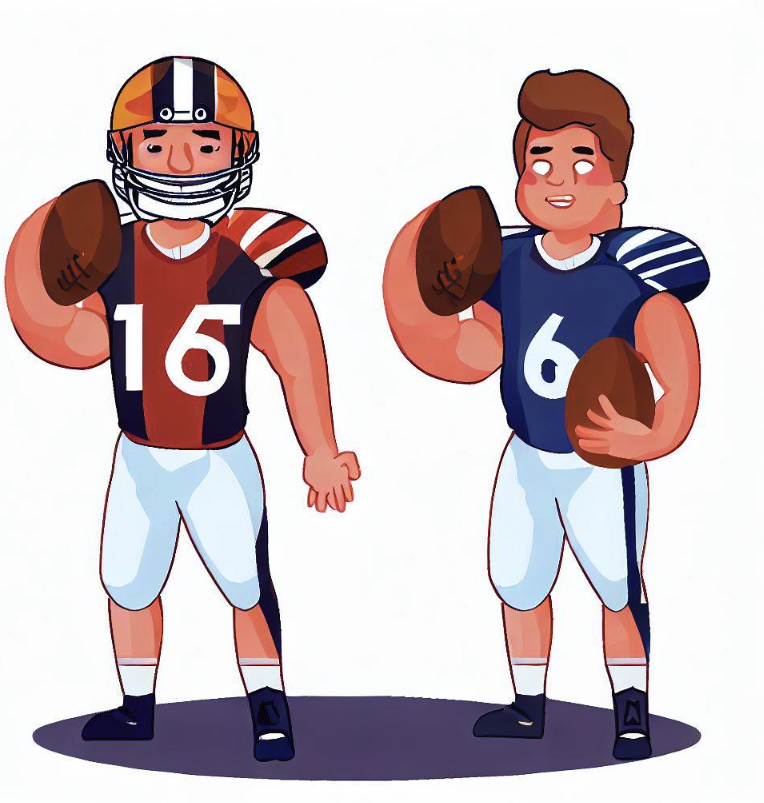Football is a complex and strategic game that requires coordination and teamwork from all players on the field.
One of the most important positions in football is the quarterback.
The quarterback is often referred to as the “field general” or the “leader” of the team.
Below we look at the role of the quarterback in football, their responsibilities, and the skills required to excel in this position.
The Role of the Quarterback
The quarterback is the player who receives the ball from the center at the start of each play.
Their primary role is to lead the offense and make decisions that will help their team move the ball down the field and score points.
The quarterback is responsible for directing the team’s offensive strategy, calling plays, and executing them effectively.
1. Play Calling
One of the key responsibilities of the quarterback is to call plays.
Before each play, the quarterback receives instructions from the coach or offensive coordinator on the sideline.
They then relay these instructions to the rest of the offense in the huddle or at the line of scrimmage.
The quarterback must have a deep understanding of the team’s playbook and be able to quickly analyze the defense to make the best play call for each situation.
2. Passing
Passing is one of the most important skills for a quarterback.
They must be able to accurately throw the ball to their intended target while under pressure from the defense.
The quarterback must have a strong arm to make long throws downfield and the touch to make short, precise passes.
They must also have excellent vision and awareness to identify open receivers and make split-second decisions on where to throw the ball.
3. Handoffs and Running Plays
While the quarterback is primarily known for their passing abilities, they also play a role in running plays.
In certain offensive schemes, the quarterback may be responsible for handing the ball off to a running back or keeping it themselves and running with it.
The quarterback must have good ball-handling skills and the ability to read the defense to make the correct decision on whether to hand off or keep the ball.
4. Audibles and Adjustments
During a play, the quarterback has the authority to change the play at the line of scrimmage based on what they see from the defense.
This is known as an audible. The quarterback may change the play to exploit a weakness in the defense or adjust the blocking assignments of his line to protect against a blitz.
This requires quick thinking and the ability to read the defense in real-time.
5. Leadership and Communication
As the leader of the offense, the quarterback must possess strong leadership skills.
They must be able to effectively communicate with their teammates, motivate them, and keep them focused during games.
The quarterback is often responsible for making adjustments and providing feedback to their teammates based on what they see on the field.
The Skills Required for a Quarterback
Being a successful quarterback requires a combination of physical and mental skills.
Here are some of the key skills that quarterbacks need to excel in their position:
1. Arm Strength
A quarterback needs to have a strong arm to make accurate and powerful throws.
They must be able to throw the ball long distances downfield and fit it into tight windows between defenders.
Arm strength is crucial for quarterbacks who need to make deep throws or throw across the field.
2. Accuracy
Accuracy is another essential skill for a quarterback.
They must be able to consistently place the ball where their intended target can catch it.
This requires a combination of arm strength, hand-eye coordination, and footwork.
Accuracy is particularly important on short and intermediate throws where the window for completion is smaller.
3. Decision Making
Quarterbacks need to make split-second decisions on where to throw the ball or whether to hand it off.
They must be able to quickly analyze the defense, identify open receivers, and make the best decision based on the situation.
Good decision-making skills can help quarterbacks avoid interceptions and maximize their team’s offensive output.
4. Football IQ
A high football IQ is crucial for quarterbacks.
They need to have a deep understanding of their team’s offensive system, defensive schemes, and situational football.
This knowledge allows them to make informed decisions, recognize patterns in the defense, and exploit weaknesses in the opposing team’s strategy.
5. Leadership and Communication
Leadership and communication skills are vital for quarterbacks.
They must be able to effectively communicate with their teammates, motivate them, and keep them focused during games.
The quarterback is often responsible for making adjustments and providing feedback to their teammates based on what they see on the field.
Can an Average Guy Throw 50% NFL Pass Completion?
FAQs – What Does the Quarterback Do in Football?
1. What is the main role of a quarterback in football?
The main role of a quarterback is to lead the offense and make decisions that will help their team move the ball down the field and score points.
2. Can a quarterback run with the ball?
Yes, a quarterback can run with the ball. In certain offensive schemes, the quarterback may be responsible for keeping the ball themselves and running with it.
3. How does a quarterback call plays?
The quarterback receives instructions from the coach or offensive coordinator on the sideline and relays these instructions to the rest of the offense in the huddle or at the line of scrimmage.
4. What skills are important for a quarterback?
Important skills for a quarterback include arm strength, accuracy, decision-making, football IQ, and leadership and communication.
5. Can a quarterback change the play at the line of scrimmage?
Yes, a quarterback has the authority to change the play at the line of scrimmage based on what they see from the defense.
This is known as an audible.
6. How important is leadership for a quarterback?
Leadership is crucial for a quarterback.
They must be able to effectively communicate with their teammates, motivate them, and keep them focused during games.
7. What is the role of a quarterback in passing plays?
In passing plays, the quarterback is responsible for throwing the ball to their intended target while under pressure from the defense.
They must have excellent vision and awareness to identify open receivers and make split-second decisions on where to throw the ball.
8. How does a quarterback read the defense?
A quarterback reads the defense by analyzing the alignment and movement of the defensive players.
They look for patterns and indicators that can help them determine the best course of action.
9. Can a quarterback audible to a running play?
Yes, a quarterback can audible to a running play if they believe it will be more effective against the defense they are facing.
10. What is the importance of accuracy for a quarterback?
Accuracy is crucial for a quarterback as it allows them to consistently place the ball where their intended target can catch it.
This increases the chances of completing passes and moving the ball down the field.
11. How does a quarterback develop their football IQ?
A quarterback develops their football IQ through studying film, analyzing game situations, and gaining experience on the field.
They must have a deep understanding of their team’s offensive system, defensive schemes, and situational football.
12. Can a quarterback be successful without a strong arm?
While a strong arm is beneficial, a quarterback can still be successful without it.
Accuracy, decision-making, and football IQ are equally important for a quarterback’s success.
13. What is the role of a quarterback in the red zone?
In the red zone, the quarterback’s role is to make quick decisions and accurate throws to score touchdowns.
They must be able to read the defense and exploit any weaknesses to find open receivers.
14. How does a quarterback handle pressure from the defense?
A quarterback handles pressure from the defense by making quick decisions, staying calm under pressure, and using their mobility to avoid sacks.
They must have good awareness and the ability to make accurate throws while under duress.
15. Can a quarterback be successful without good leadership skills?
While leadership skills are crucial for a quarterback’s success, it is possible for them to be successful without exceptional leadership skills.
However, strong leadership skills can greatly enhance a quarterback’s ability to lead their team to victory.
16. What are the skills and roles of the quarterback in football?
Here are some of the key skills and roles associated with the quarterback position:
- Passing Skills: The quarterback must have excellent throwing accuracy, arm strength, and the ability to make quick decisions when selecting targets.
- Leadership: The quarterback is often considered the leader of the offense. They must be able to motivate their teammates, communicate effectively, and make decisions under pressure.
- Decision-Making: The quarterback analyzes the defense, reads the field, and makes split-second decisions about whether to pass the ball, hand it off to a running back, or scramble.
- Football IQ: Quarterbacks need a deep understanding of the game, including offensive and defensive strategies, formations, and various play concepts.
- Pre-Snap Adjustments: The quarterback may need to make adjustments to the play call based on the defensive alignment, such as changing the protection scheme or audibling to a different play.
- Communication: Quarterbacks are responsible for relaying play calls to their teammates, often using hand signals or verbal commands, and must be able to effectively communicate with coaches and other players on the field.
- Mobility: While not essential, mobility and the ability to escape pressure can be advantageous for a quarterback. Mobile quarterbacks can extend plays, avoid sacks, and create opportunities with their feet.
- Pocket Presence: The ability to navigate the pocket, sense pressure, and maintain composure while under duress is crucial for a quarterback. They must be able to find open passing lanes and deliver accurate throws.
- Field Vision: Quarterbacks need to have excellent peripheral vision and the ability to scan the field, read defenses, identify open receivers, and make accurate throws.
- Adaptability: Successful quarterbacks must be adaptable to different game situations, opponent strategies, and changing circumstances throughout the course of a game.
- Work Ethic: Quarterbacks typically have extensive film study and preparation requirements. They need to dedicate significant time to studying opponents, reviewing plays, and improving their own skills.
- Mental Toughness: The quarterback position can be physically and mentally demanding. Quarterbacks must be able to handle pressure, overcome adversity, and maintain focus throughout a game.
These skills and roles can vary depending on the specific offensive system and coaching philosophy employed by a team.
Different quarterbacks may excel in different areas, and the importance of each skill may vary based on the team’s strategy.
Summary
The quarterback is a vital position in football, responsible for leading the offense and making critical decisions on the field.
They must possess a combination of physical skills such as arm strength and accuracy, as well as mental skills like decision-making and football IQ.
The quarterback’s role extends beyond throwing the ball, as they also play a role in running plays, calling plays, making audibles, and providing leadership to their teammates.
A successful quarterback can have a significant impact on the outcome of a football game, making them a key player to watch on the field.


